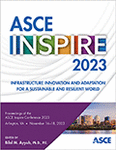Optimal Design and Life-Long Adaptation of Civil Infrastructure under Climate Change and Uncertain Demands
Publication: ASCE Inspire 2023
ABSTRACT
Various climate change effects pose increasing risks to the nation’s infrastructure. Available methodologies address the risk-management problem primarily through cost-benefit analysis frameworks, which evaluate a comprehensive set of protection strategies against a wide range of simulated possible future scenarios. However, due to the substantial climate model uncertainties present over the future planning horizon, such strategies can often lead to less informed policies that might be optimal in an average sense, over the mean of anticipated future scenarios, but cannot offer adaptive solutions based on the actual climate effects evolving in time. To address these limitations, in this research, climate risk mitigation is instead formulated as a decision-making problem within a closed-loop stochastic control-based framework using Markov decision processes (MDP), taking real-time data into account, for evaluating the evolving conditions, and selecting the best possible, most informed life-cycle actions in time. Although broadly applicable, the merit of the framework will be illustrated through coastal risk mitigation against storm surge and sea-level rise in an idealized coastal city setting.
Get full access to this article
View all available purchase options and get full access to this chapter.
REFERENCES
Andriotis, C. P., and Papakonstantinou, K. G. (2021). “Deep reinforcement learning driven inspection and maintenance planning under incomplete information and constraints.” Reliability Engineering & System Safety, 212, 107551.
Arias, P., et al. (2021). Climate change 2021: The physical science basis. Contribution of Working Group I to the Sixth Assessment Report of the Intergovernmental Panel on Climate Change; Technical Summary.
Ceres, R. L., Forest, C. E., and Keller, K. (2017). Understanding the detectability of potential changes to the 100-year peak storm surge. Climatic Change, 145, 221–235.
Ceres, R. L., Forest, C. E., and Keller, K. (2019). “Optimization of multiple storm surge risk mitigation strategies for an island city on a wedge.” Environmental Modelling & Software,119, 341–353.
Fox-Kemper, B., et al. (2021). Ocean, Cryosphere and Sea Level Change. In: Climate Change 2021: The Physical Science Basis. Contribution of Working Group I to the Sixth Assessment Report of the Intergovernmental Panel on Climate Change.
Cambridge University Press. (Forthcoming). Sea Level Projections from the IPCC 6th Assessment Report. <https://podaac.jpl.nasa.gov/announcements/2021-08-09-Sea-level-projections-from-the-IPCC-6th-Assessment-Report>(accessed June 20 2023).
Lin, N., Emanuel, K. A., Smith, J. A., and Vanmarcke, E. (2010). Risk assessment of hurricane storm surge for New York City. Journal of Geophysical Research: Atmospheres, 115.
New York State Department of Environmental Conservation. (2022). Appendix: NYS Social Cost Values. <https://www.dec.ny.gov/docs/administration_pdf/vocapp22.pdf>(accessed June 20 2023).
NOAA. (2023). NOAA Tides & Currents, <https://tidesandcurrents.noaa.gov/waterlevels.html?id=8518750>(accessed June 20 2023).
Nordhaus, W. D. (2017). Revisiting the social cost of carbon. Proceedings of the National Academy of Sciences, 114, 1518–1523.
Ororbia, M. E., and Warn, G. P. (2023). “Design synthesis of structural systems as a Markov decision process solved with deep reinforcement learning.” Journal of Mechanical Design, 145(6), 061701.
Puterman, M. L. (2014). Markov decision processes: Discrete stochastic dynamic programming. John Wiley & Sons.
Papakonstantinou, K. G., and Shinozuka, M. (2014). “Planning structural inspection and maintenance policies via dynamic programming and Markov processes. Part I: Theory.” Reliability Engineering & System Safety, 130, 202–213.
Smith, T., and Simmons, R. (2006). Focused real-time dynamic programming for mdps: Squeezing more out of a heuristic. In Proceedings of the AAAI Conference on Artificial Intelligence, 1227–1232.
Ward, P. J., et al. (2017). “A global framework for future costs and benefits of river-flood protection in urban areas.” Nature Climate Change, 7, 642–646.
Information & Authors
Information
Published In
History
Published online: Nov 14, 2023
ASCE Technical Topics:
- Business management
- Climate change
- Climates
- Coastal engineering
- Coastal processes
- Coasts, oceans, ports, and waterways engineering
- Disaster risk management
- Engineering fundamentals
- Environmental engineering
- Infrastructure
- Infrastructure vulnerability
- Markov process
- Mathematics
- Mitigation and remediation
- Practice and Profession
- Probability
- Risk management
- Stochastic processes
- Storm surges
Authors
Metrics & Citations
Metrics
Citations
Download citation
If you have the appropriate software installed, you can download article citation data to the citation manager of your choice. Simply select your manager software from the list below and click Download.
